- Home
- Steven Pressfield
The Afgan Campaign
The Afgan Campaign Read online
The Afgan Campaign
Steven Pressfield
Steven Pressfield
The Afgan Campaign
“Do you believe that so many nations accustomed to the name and rule of another, united with us neither by religion, nor customs, nor community of language, have been subdued in the same battle in which they were overcome? It is by your arms alone that they are restrained, not by their dispositions, and those who fear us when we are present, in our absence will be enemies. We are dealing with savage beasts, which lapse of time only can tame, when they are caught and caged, because their own nature cannot tame them… Accordingly, we must either give up what we have taken, or we must seize what we do not yet hold.”
— Alexander, addressing his troops on the approach to Afghanistan
PROLOGUE
A Wedding in Asia
The war is over. Or it will be by sundown tonight, when Alexander takes to wife the Afghan princess Roxane.
Across the Plain of Sorrows, so named for the multitude of its burial grounds, the camps of the Macedonians sprawl flank-by-flank alongside those of the enemy. There must be half a thousand of the latter, those bivouacs the Afghans call tafiran (“circles”), each housing between fifty and five hundred men. Every tribe and clan from Artacoana to the Jaxartes has trekked in for the celebration, along with vendors and whores in thousands, tailors, seamstresses, acrobats, musicians, fortune-tellers. The whole Mack expeditionary force is here, including foreign units, horse and foot. Every captain and corporal parades in his finery, eager for the festivities. Except me and my mates Flag, Boxer, and Little Red. We’ve still got work to do.
Give Alexander credit. By marrying the Afghan princess, he turns his most formidable foe, the warlord Oxyartes, into his father-in-law. No other stunt could have produced victory in this war-or that state of affairs that can plausibly be passed off as victory.
So we shall have peace. I doubt that any cessation of hostilities has been longed for more ardently than this. A campaign that was supposed to take three months has dragged on with unbroken terror and brutality for almost three years. Those of us who came out from home as boys have become first men and then something closer to beasts or devils. The Afghans have suffered worse. Two hundred thousand dead, that’s the figure you hear. I believe it. Hardly a village remains in this country that our troops haven’t leveled, or a city that we haven’t taken apart stone by stone.
So this wedding is much looked forward to. The deal between Alexander and Oxyartes is this: The warlord gives away his daughter and accepts our king as his sovereign. In return, Alexander anoints him First Kinsman and his own Royal Companion. This makes Oxyartes premier among all Bactrian barons and the biggest fish east of the Euphrates. Then we Macedonians pack up and leave. I don’t know who’s happier-us to get out or the Afghans to see us go.
I’m getting married tonight myself. Fourteen hundred Macks will be linking with Afghan girls in one collective ceremony. My bride’s name is Shinar. It’s a long story; I’ll tell it as we go along.
My mate Flag dismounts now outside the tent as I finish arming. He’s about forty and the hardest knot I know. He has taught me everything. I would march into hell at his side.
He enters dressed in formal military kit, for the wedding. I indicate his cloak. “You’ll be roasting in that thing.”
Flag tugs back one wing. Beneath his left arm, a xiphos sword is strapped to his ribs. He’s got an Afghan long-knife lashed along one thigh and throwing-daggers inside both boots. He carries two more weapons in plain view, a ceremonial sword on a baldric and a nine-foot half-pike. These are for show. To give Baz (the name we Macedonians apply to any Afghan) something to fix his eyes on.
Boxer and Little Red have reined outside. In a few moments we’ll make our way across the plain to the camp of the Aletai Pactyans. There, I will meet the brother of my bride and pay him off, an indemnity of honor, so he won’t murder me and his sister. The price is four years’ wages and my best horse.
Such is Afghanistan. Only out here do you have to bribe a brother not to slaughter his own sister. Her crime: being with me.
Of course I suspect treachery. That’s what the weapons are for. In a way I’m hoping for it. Otherwise, our own Mack code of philoxenia (“love for the stranger”) forbids me to take the life of one of the family I marry into. I’m an idiot for still buying it, but there it is.
Atop the citadel, the crier calls. Two hours past noon. The Persian day starts at sundown. That’s when the wedding will take place. Lesser ceremonies have been going on all day. Late afternoon will be the military tattoo. The whole Mack army and all the Afghan clans and tribes will pass in review before Alexander, Roxane, and the dignitaries. The big wedding, the royal one, will take place in Chorienes’ palace atop the fortress of Bal Teghrib, “Stone Mountain.” The mass ceremony, the one where Shinar and I will get tied, takes place outdoors in the new stadium at the foot of the hill. When the weddings are over, the celebrations begin.
“All right,” says Flag. “Let’s go over this one more time.”
Flag is by far our senior. His rank is Flag Sergeant. He has a personal name but I’ve never heard anyone use it. We just call him by his rank.
He rehearses us in blocking moves. What’s critical is that Shinar’s brother and his two cousins not escape. They can’t be allowed to break away or survive with wounds. Our blows must be fatal. These three are Shinar’s last male kin. No others stand under the obligation of nangwali, the Afghan code of honor, to see that “justice” is done. Brother and cousins slain, we can buy our way out of the crime. Money will patch it up. But these three must go down.
I am grateful to my comrades. This is serious peril that they undergo for my sake. I’d do the same for them, and they know it. They’ll be embarrassed if I express gratitude overtly. When it’s over, if we’re all alive, I’ll get each of them a woman or a horse.
“All I can say,” says Little Red as we finish our preparations, “is this is a hell of a way to warm up for a wedding.”
As my mates and I cinch up, my bride appears in the portal. She will bathe now and, assisted by her bridesmaids, perform the karahal, the Pactyan purification rite. No male may witness this. She meets my eye. “When will you go, Matthias?”
“Now.”
A groom brings my horse. My mates have already mounted.
The Afghan farewell is tel badir, “With God’s care.” Shinar signs this to me. I sign back. Flag’s heels tap his pony. “Now or never.”
We’re off. To perform, if we must, one final murder; then get the hell out of this country.
BOOK ONE
A Common Soldier
1
I am the third and last son of my family to come out to Afghanistan. My older brothers went out as cavalrymen. I signed with the infantry.
The distinction between horse and foot is not so great in Afghanistan as it was in Alexander’s earlier campaigns in Asia Minor, Mesopotamia, and Persia. Out east, an infantryman is expected to leap onto the back of any creature that will bear his weight-horse, mule, ass, or yaboo (the Afghan pony)-and ride to the site of action, there to dismount and fight, or even fight from the beast’s back if necessary. Likewise horse troopers, even the King’s Companions, think nothing of hitting the ground and slugging it out on foot alongside the dirt-eaters.
My father was killed in Afghanistan, or more precisely he expired of sepsis in a military hospital in Susia, in the province of Areia, which lies on the western border of the country. My father was not a mounted warrior or a foot soldier but a combat engineer of the siege train-what the troops call a “bucket man” because miners and sappers dig their trenches and raise their earthworks with wicker baskets. His name was the same as
mine, Matthias.
My father fought at the Granicus River, at Tyre, Gaza, and at Issus. He was an authentic hero. My brothers are too. Once, when I was sixteen, my father sent home an army warrant worth a quarter talent of gold. We bought a second farm with it, with two barns and a year-round creek, and had enough left over to fence the place in stone.
It was my father’s keenest wish that I, the youngest brother, not come out to war. My mother, further, was violently opposed to any step that would take me away from the land. “You may call it your misfortune, Matthias,” she declared, “to have been whelped last of the litter. But, like it or not, you are my bulwark and the bulwark of this farm. Your father is gone. We shall never see your brothers again. Lust for glory will be their finish; they will leave great names and nothing more.”
My mother feared that I, gone overseas, would tread into the snare of some foreign wench and, taking her to wife, never return to Macedon.
I was eighteen, however, and as mad for glory as every other overheated young blood in a kingdom whose twenty-five-year-old sovereign, Alexander son of Philip, had in only four years sacked earth’s mightiest empire and turned our homeland delirious with conquest, fame, and treasure.
In the Macedonian army, enlistments are measured not by years but by cycles, or “bumps.” A bump is eighteen months. Minimum enlistment is two bumps, one to be trained and one to serve, but a man must commit for a third cycle, a total of four and a half years, if and when he is called overseas. It worked this way: A recruit entered service with a regiment of the Occupation Army. This was the force left behind by Alexander to hold down Greece and the tribal north. All these contingents were territorial; you had to come from the district or you couldn’t get in. As Alexander’s needs in Asia necessitated, he sent home for replacements. Sometimes entire regiments were called up; other times individuals, either those in specific military specialties such as intelligence or siege engineering, or simply infantrymen with seniority whose lucky number came up.
All this was moot for a youth of my district, Apollonia. Apollonia has no infantry regiment. The region is cavalry country. The most famous squadron of Alexander’s Companions, the ile of Socrates Sathon, comes from Apollonia. This squadron, in which both my brothers served, led the charge at the battle of the Granicus River; it fought at Alexander’s right hand in the great victories of Issus and Gaugamela. It has more hero statues at Dium than any other squadron, including the Royal. My best friend Lucas and I, and every other war-crazed youth in the territory, had trained year-round since before we could walk, on fire for the day we would enter the trials and with heaven’s aid become, like Apollonia’s heroes before us, King’s Companions.
We were too late, Lucas and I. By the time our hour came, Alexander’s army had pushed so deep into Asia and had assimilated troops from so many vanquished nations that our king no longer sent home for Companion cavalry, except to replace men killed, wounded, or retired. The horse troops he employed now were all hired squadrons-Persians mostly, with Syrians, Lydians, Cappadocians, and riders of other kingdoms of the conquered East. No Mack could join these, even if he could get overseas, which he couldn’t, or could speak the barbarian tongue, which he wouldn’t.
There was only one way for Lucas and me to get out to Asia. As hired infantry. As mercenaries.
At that time, scores of private contractors-called pilophoroi for the felt caps they wore-traveled the cities of Greece and Asia Minor, signing up troops. It was a business. Candidates paid a fee, called a “pony” because it was so steep a man could buy a fine colt with it. The felt-caps got them in.
Turning eighteen, Lucas and I trekked three days to the port of Methone, the hiring depot for mercenary infantry. The taverns were crawling with grizzled professionals-Arcadians and Syracusans, Cretans and Rhodians, even officers of the Achaeans and Spartans. They all knew each other from prior hitches; they had mates and commanders who could get them aboard. Lucas and I were the youngest by years. We knew nobody. No pilophoros would touch us, no matter how convincingly we lied about our age or our service histories (of which we had none).
We stayed ten days, with our payoff cash dwindling rapidly, trying to talk or buy our way in anywhere. At the last hour we went seeking the recruiting general himself. Of course we couldn’t get near him. A Line Sergeant from Pella kicked us out. “Wait a minute,” he said, hearing our accents. “Are you boys from Apollonia?”
He wanted to know if we could ride.
We were centaurs!
The sergeant drew up our papers on the spot and wouldn’t take any money either. He put us down as Mounted Infantry. That was what Alexander needed most. Lucas and I could not believe our luck. We asked what outfit we’d be with and when we’d get our horses.
“No outfits,” the sergeant said. “And no horses neither.” He had put us on the rolls because we were Macedonians, amid all these foreigners. “No overseas captain ever turned down a lad from home.”
We thanked him with all our hearts. He brushed it off. “Don’t worry about what outfit you ship out with, or if you never see an hour of drill. Out east,” he said, “the king’ll draft you wherever he needs you.”
2
Our force of replacements landed at Tripolis in Syria on the sixteenth of Daesius, early summer, in the sixth year of Alexander’s reign, the fourth since the expeditionary force had crossed out of Europe into Asia. The king and his army were then a thousand miles east, on their way from Persepolis, Persia’s capital, to Ecbatana in Media, the summer palace of her kings. The Persian Empire had fallen; Alexander now pursued its fugitive king. Our lord’s pack train, reports said, was seven thousand camels and ten thousand pairs of asses, all laden with gold.
Our detachment of replacements was sixty-one hundred in forty-seven ships. The harbor at Tripolis couldn’t hold that many, and, as the vessels had neither berths nor provisions to lie-to overnight in the roads, a conference was held of the captains, who were just merchant skippers hired for pay, at which it was decided that our ferry (which is what it was) and about ten others would be rowed to shallow water, where we scuffs were told to grab our kit, hop over the side, and swim for it. Which we did. It was a grand lark, except that I ruined a fine pair of boots in the saltwater, growing too weary to hold them over my head. This is how I landed in Asia, soaked as a drowned cat, and barefoot.
Replacements are not an army. Our mob had been formed not into regiments but into “S.C.’s,” shipboard contingents, and did not, when we landed, even have our arms. The cavalry didn’t have its horses. The animals were following in other transports. There was a tent city waiting, and an escort of six hundred Syrian mercenaries, and fourteen hundred hired infantry of Lycia, with Macedonian officers, who were to take us up to Marathus and from there by way of Larissa to Thapsacus, where we would cross the Euphrates into Mesopotamian Syria and Kurdistan. The march to catch up with Alexander would take between three and four months.
As always in a new camp, the troops plunged at once into their favored pastimes-touring the site looking up friends, and poaching every item of kit they could lay hands on. You couldn’t set down a heel of bread without somebody snatching it, and a decent hat or a pair of road-slappers were sure goners. A man hung his purse next to his testicles and, after shaking hands with a stranger, checked to make sure both sacks were still where he had left them.
In Alexander’s fighting army, every trooper knew the mark he was to stand on. But here, a thousand miles to the rear, the show was all orphan stew. You ate when the cooks opened the tents and bunked where you could find a patch of dirt wide enough to hold your bones. You kept with your mates to keep the scroungers from picking you blind. My bunch was Lucas; Terres, called “Rags” for his dandy’s love of clothes; and Peithon, undersized, called “Flea.” We were all from Apollonia, all eighteen, and had known each other all our lives.
Lucas was our leader. He was a born operator and set out to keep our heads above the general ruck. We were supposed to get paid on l
anding at Tripolis (it’d been a month, marshaling and crossing), but if there was any shine with this mob, I never saw it. In fact we had to pay, ourselves. The slugs at the cook-tent wanted cash to get in. You had to pay to take a crap.
“We’ve got to find ourselves a bull,” pronounced Lucas. Meaning someone with rank to attach ourselves to.
We found him in a Color Sergeant named Tolmides. Tollo for short. He was a stubby fellow with great mustaches and a boar’s-tusk cap, a mate of Lucas’s father, and in charge here of a company of Lycian infantry. Lucas spotted him in the latrine line. “Hey, Tollo! Where’s a scuff take a free shit around here?”
Tollo came over, laughing. “By Hades’ balls, you little offscourings got all growed up, did you?” His rank was no joke though. He was a big onion. He got us out of camp. We chowed down with his Lycians out on the plain.
What, we asked, were the chances of getting paid?
About the same as crapping ivory.
When do we get assigned to regiments?
When you pay off the officers escorting you.
What about kit?
We would not be issued arms till Thapsacus or later, Tollo told us, and when we did we’d have to cough up for those too. “Don’t worry, the quartermaster’ll put it against your roll.” Meaning our pay records. We’d tick it down out of time served.
Lucas looked glum. “They didn’t tell us this back home.”
“If they did, you wouldn’t have come out,” said Tollo. And he laughed.
We glued ourselves to him. He and his Mack comrades had served as scouts in Forward Operations, running reconnaissance for Alexander in Areia and Afghanistan. They had been sent back to train us replacements on the march. They got double pay for this, and double that for escort duty.

 The Legend of Bagger Vance: A Novel of Golf and the Game of Life
The Legend of Bagger Vance: A Novel of Golf and the Game of Life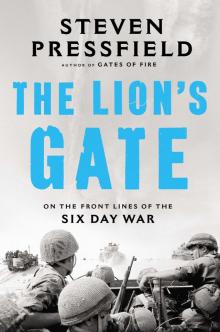 The Lion's Gate: On the Front Lines of the Six Day War
The Lion's Gate: On the Front Lines of the Six Day War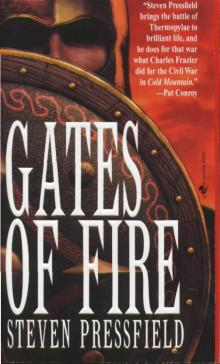 Gates of Fire
Gates of Fire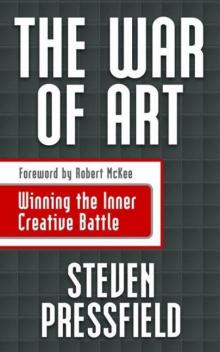 The War of Art
The War of Art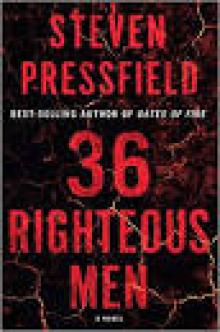 36 Righteous Men
36 Righteous Men The Virtues of War
The Virtues of War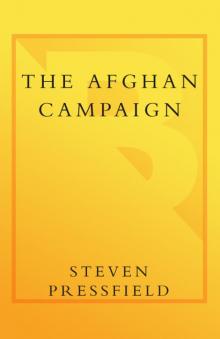 The Afghan Campaign
The Afghan Campaign Killing Rommel
Killing Rommel Last of the Amazons Last of the Amazons Last of the Amazons
Last of the Amazons Last of the Amazons Last of the Amazons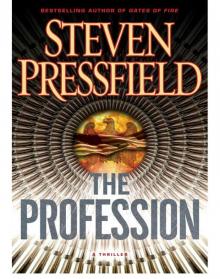 The Profession
The Profession Last of the Amazons
Last of the Amazons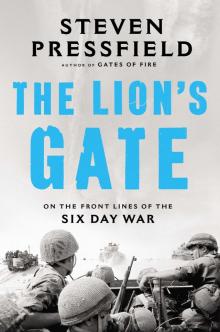 The Lion’s Gate
The Lion’s Gate The Legend of Bagger Vance
The Legend of Bagger Vance Virtues of War
Virtues of War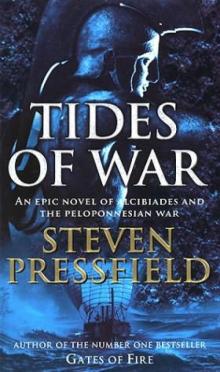 Tides of War, a Novel of Alcibiades and the Peloponnesian War
Tides of War, a Novel of Alcibiades and the Peloponnesian War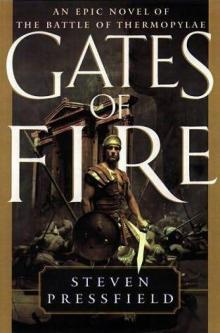 Gates of Fire: An Epic Novel of the Battle of Thermopylae
Gates of Fire: An Epic Novel of the Battle of Thermopylae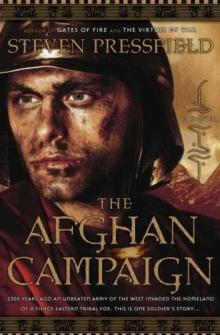 The Afgan Campaign
The Afgan Campaign